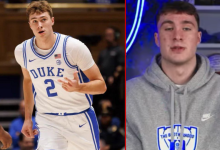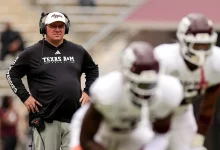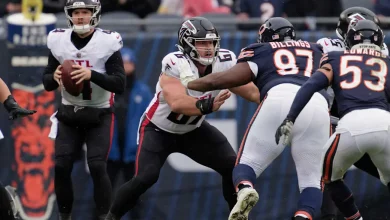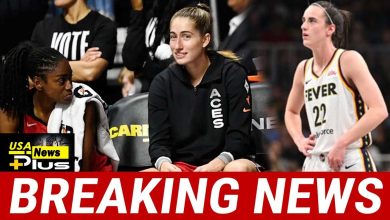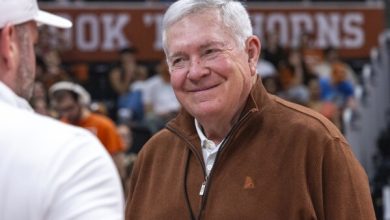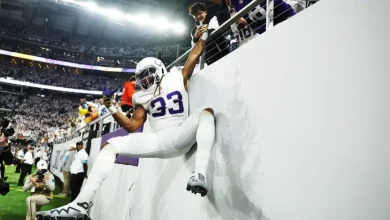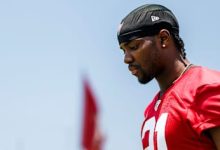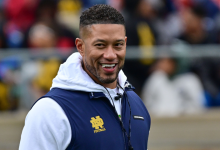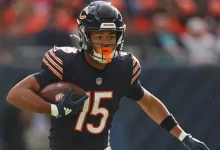What Patrick Mahomes dodged – The Chicago Bears have ruined quarterbacks, and now they could do the same to Caleb Williams
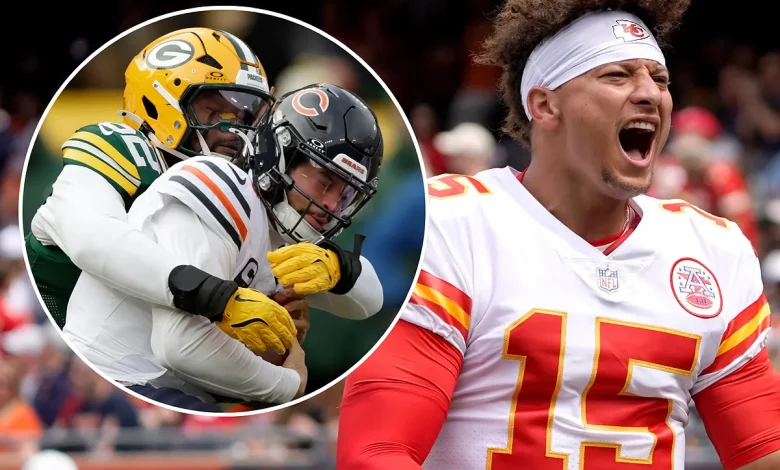
In 2017, the Chicago Bears were on the clock. They held the No. 2 overall pick and needed a franchise quarterback. They bypassed Patrick Mahomes—widely regarded now as one of the greatest quarterback talents of all time—in favor of Mitchell Trubisky, a one-year starter from North Carolina. Mahomes went to Kansas City at No. 10, where Andy Reid crafted a dynasty around him. The Bears? They continued the long, painful tradition of mismanaging quarterbacks, a legacy that may now threaten Caleb Williams, the most anticipated signal-caller to land in Chicago since perhaps Sid Luckman.
Williams, the 2022 Heisman Trophy winner, is a generational talent out of USC, heralded for his arm talent, playmaking ability, and poise under pressure. But for all of Williams’ gifts, one major question looms: can any quarterback thrive in the quarterback graveyard that is Chicago?
The Quarterback Curse
Since the Super Bowl era began, no franchise has mishandled the quarterback position more consistently than the Chicago Bears. The team’s all-time leading passer, Jay Cutler, left the franchise with more interceptions (109) than wins (51). Before Cutler, names like Rex Grossman, Cade McNown, Kordell Stewart, and Shane Matthews read like a cautionary tale. Even Justin Fields—who displayed flashes of brilliance—was ultimately traded away, his development stunted by questionable coaching, poor offensive line play, and a revolving door of coordinators.
The Bears have had over 30 starting quarterbacks since 2000. None has made a Pro Bowl while in Chicago. The team’s inability to develop a franchise QB is not about bad luck—it’s systemic. It’s about ownership structure, inconsistent coaching staffs, lack of offensive vision, and organizational dysfunction that dates back decades.
Patrick Mahomes dodged this fate. Caleb Williams might not be so lucky.
The Mahomes Factor
It’s impossible not to compare Caleb Williams’ entrance to what Mahomes avoided. If the Bears had taken Mahomes in 2017, would he have become the two-time MVP and three-time Super Bowl champion he is today? Or would he have suffered the same fate as Trubisky—overwhelmed by poor offensive schemes and a lack of playmakers?
Mahomes was given a redshirt year behind Alex Smith. He had one of the greatest offensive minds in football, Andy Reid, guiding him. He had stability. Continuity. A franchise that builds around quarterback excellence.
The Bears have historically done the opposite. Trubisky started too early, paired with conservative offenses, then replaced by Nick Foles, then Andy Dalton. Fields endured three offensive coordinators in three years and was never given an elite offensive line or consistent receiver support. The Bears treat quarterbacks like stopgaps, not centerpieces.
Had Mahomes landed in Chicago, there’s a real chance his career arc would have been dramatically different—and not in a good way.
Why Caleb Williams Is Different (But Might Not Matter)
Caleb Williams has all the traits you want in a franchise quarterback: elite arm strength, creative off-script ability, and a knack for big moments. He accounted for 93 touchdowns in two seasons at USC, often dazzling with throws that defied physics.
But even a player with his ceiling needs the right situation. And that’s what makes Chicago’s track record so alarming. Williams is walking into an organization that has failed to protect and develop quarterback talent for decades. While new GM Ryan Poles and head coach Matt Eberflus are trying to rebrand the franchise’s image, the burden of history is heavy.
There are signs of hope: the Bears traded for wide receiver Keenan Allen, drafted Rome Odunze, and signed running back D’Andre Swift. The offensive line is improving. Offensive coordinator Shane Waldron comes from Seattle, where he helped shape Geno Smith’s renaissance.
But history warns us: hope and change are two different things. Even Fields, once seen as a steal in the 2021 draft, was surrounded by similar optimism—until it all unraveled.
The System Problem
Quarterbacks succeed in environments that cater to their strengths. Joe Burrow in Cincinnati. Josh Allen in Buffalo. Lamar Jackson in Baltimore. Mahomes in Kansas City.
Williams thrives in tempo-based systems that allow him to freelance and throw on the run. He needs time, structure, and a scheme that values play-action and vertical threats. If the Bears try to force him into a West Coast check-down offense or rely too heavily on pocket passing behind a mediocre line, they will squander his unique skill set.
This is what happened to Trubisky, who was athletic and had a strong arm but was never allowed to develop with tailored play designs. It’s what happened to Fields, who was asked to play from behind constantly and given few designed runs in his rookie year.
For Williams to succeed, the Bears must commit to a long-term plan: consistent coaching, weapons that stay healthy, and an offensive philosophy that evolves with him. It sounds simple. But it’s exactly what Chicago has never done.
The Pressure Cooker
No NFL city puts more emotional weight on its quarterback than Chicago. Decades of futility have made the fanbase desperate. Williams arrives with more hype than any Bears quarterback in modern history. He’s not just expected to be good—he’s expected to save the franchise.
The media glare will be intense. Every interception will be analyzed. Every loss will spark talk-radio meltdowns. If he falters early, questions about his leadership, commitment, or even style will dominate the narrative. It’s an environment that has broken quarterbacks before.
Mahomes never had to carry that kind of weight as a rookie. He was developed out of the spotlight, with time and patience. Williams may not be afforded that luxury. The Bears picked him No. 1 overall. They traded away Fields. They built the offseason around him.
He has to deliver. Fast.
What the Bears Must Do Right
If Chicago is serious about ending the quarterback curse, the formula isn’t complicated—but it requires discipline.
- Protect Him: Williams can’t reach his ceiling if he’s running for his life. Investing in the offensive line must remain a priority. One injury to a tackle could change the season.
- Scheme to Strengths: Let him use his legs. Give him RPOs. Install bootlegs and play-action rollouts. Don’t make him a robot in the pocket.
- Stability: Stick with Waldron unless disaster strikes. Rotate coordinators and you restart his development clock.
- Playmakers, Playmakers, Playmakers: Allen is a nice veteran. DJ Moore is a strong WR1. Rome Odunze could become elite. But don’t stop here. Give him weapons every year.
- Let Him Fail: Mahomes threw 12 interceptions in his first full season. Josh Allen was a mess as a rookie. Growth takes time. The Bears can’t overreact to mistakes.
What Happens If They Don’t?
If the Bears repeat history, the consequences could be devastating. Caleb Williams, burdened by poor coaching and system failure, could regress. He could lose confidence. He could become the next in a long line of “what could have been” in Chicago.
And unlike past flameouts, the damage would be worse. Williams isn’t Trubisky. He’s not a gamble. He’s a generational prospect. Missing on him wouldn’t just set the franchise back—it would devastate it. Fans, tired of the same script, would check out. Coaches would be fired. Poles’ tenure would be questioned. Another rebuild would follow.
The clock is ticking.
Final Thoughts: Will Caleb Be Different?
Caleb Williams has the skill set, the mindset, and the charisma to change Chicago football forever. But even the best quarterback needs a team behind him—coaches who believe in him, a line to protect him, receivers to trust, and an ownership group willing to commit to offense as the team’s identity.
Patrick Mahomes never had to overcome that in Kansas City. He landed in the perfect situation. Caleb Williams must build his own success out of the ashes of Bears quarterbacks past.
The question isn’t whether he’s talented enough. The question is whether the Bears will finally rise to the level of their quarterback—or drag him down like all the others before him.

